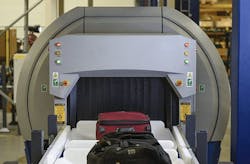TSA eyes open-systems explosives detection algorithms for rapid upgrades to airport security systems
ARLINGTON, Va. – U.S. government airport security experts are moving forward with a project to develop vendor-neutral software for explosives detection in baggage-screening systems at airports and other ports of entry.
The idea is to develop open-systems explosives-detection software applications that can run on many different baggage-screening systems to enable TSA to compete airport security technology widely through industry, and ensure passenger security systems have the latest technologies.
Officials of the U.S. Department of Homeland Security's Transportation Security Administration (TSA) in Arlington, Va., announced plans Thursday to award an estimated $3 million one-year contract to Stratovan Corp. in Davis, Calif., to develop explosives detection algorithms able to run on a variety of baggage-screening systems -- especially those made by Smiths Detection, L-3 Communications, and Leidos.
This sole-source contract would continue an effort with Stratovan, and expand development of the vendor-neutral automated threat recognition software, on which the company already has started development.
Related: French airport adopts Implant Sciences explosives detection devices to protect travelers
Stratovan has developed an automated threat recognition algorithm with machine learning capability that uses computed tomography (CT) imaging technology developed originally for medical applications for explosives detection in a Smiths Detection CTX-9800 baggage-screening system. The idea was to determine if a third party could develop vendor-neutral algorithms.
Stratovan has developed a software-development kit (SDK) to convert vendor-proprietary CT-formatted data into a standardized image format for Digital Imaging and Communication in Security (DICOS), and created vendor-neutral automated threat recognition, TSA officials say.
This contract asks Stratovan to update the company's previously developed SDK to the new DICOS 2.0A standard, and provide software tools necessary for third-party development. The company will provide a software library and conformance testing suite to help convert native security vendor data to the new DICOS 2.0A standard.
The DICOS standard, overseen by the National Electrical Manufacturers Association (NEMA) in Arlington, Va., specifies an extensible, interoperable data format that enables the integration of security screening technologies across systems from several different vendors, and facilitates wide participation in developing improved security screening technologies and algorithms.
In addition, this contract asks Stratovan engineers to enable the algorithm to detect home-made explosives and integrate it into an explosives-detection machine. If this works, TSA officials will be able to select automated threat recognition technologies independently of systems vendors.
In this way TSA can avoid being locked-in to explosives-detection technologies that are specific to baggage-screening system suppliers. In addition, TSA officials expect to upgrade explosives-detection capability of baggage-screening devices quickly by going to an industry-standard format.
This should enable TSA to address emerging threats with more resilience and capitalize on innovative solutions in the open market quickly from third party developers.
TSA officials have determined that the most effective way to enhance explosives-detection algorithms while mitigating the risk of a false alarm is through machine learning technology, which Stratovan provides.
Updating the baggage-screening SDK, compliance checker, and certifier to the most recent DICOS standard will help TSA implement the DICOS format, which ultimately will enable third party algorithm development, allow for full and open supplier competitive, TSA officials say.
For more information contact Stratovan Corp. online at www.stratovan.com, the Transportation Security Administration at www.tsa.gov, or NEMA DICOS at www.nema.org/Standards/Pages/Digital-Imaging-and-Communications-in-Security-Information-Object-Definitions.aspx.
Ready to make a purchase? Search the Intelligent Aerospace Buyer's Guide for companies, new products, press releases, and videos
